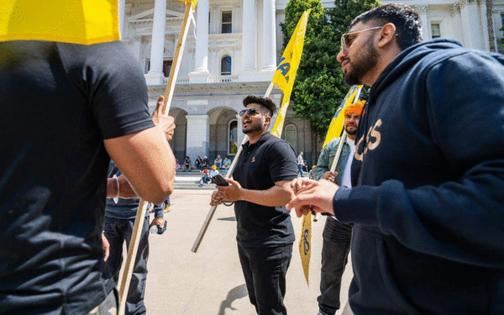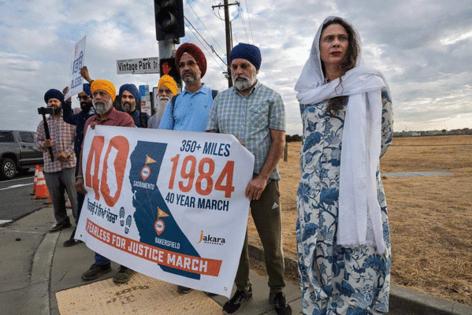Will Gavin Newsom sign bill to protect Californians targeted by foreign governments?
Published in News & Features
SACRAMENTO, Calif. — California could become the first state in the nation to create protections for people who are targeted by foreign nations, if the governor signs legislation passed by the Assembly and Senate unanimously last month.
Backers of the bill point to instances in California when Iranian dissidents were stalked for their advocacy, Chinese activists have been attacked at protests and when Sikh activists have been targeted with assassination.
SB 509, authored by Senator Anna Caballero, D-Merced, and Assemblywoman Jasmeet Bains (D-Delano), aims to combat what they see as a growing threat of transnational repression or TNR — defined by the FBI and other intelligence experts is when foreign governments seek to intimidate, harass, threaten, or harm individuals living outside their home country.
Opponents of the legislation say SB 509 will create threats to freedom of speech and unfairly targets India.
In a statement opposing SB 509, CoHNA, the Coalition of Hindus of North America, claimed that on an FBI list of 20 TNR cases in the United States, there is only one case against India, while the rest are related to countries like China, Iran and Russia.
“So why this misplaced focus, especially given the alarming levels of anti-Hindu hate recorded by the California’s Hate Hotline and as well as multiple attacks on Hindu temples?” the statement asks.
Advocates also say that SB 509 could also serve as a counterweight to ICE deportations which are occurring with little transparency and run the risk of playing into the hands of repressive regimes. Adding to that concern, on Monday evening 120 Iranians who had been in ICE detention were placed on a plane by the Trump administration and are being returned to Iran, part of an unusual agreement with the government of Iran. How many of the deported refugees were seeking political asylum is not known at this point
An Iranian refugee himself, Hamid Yazdan Panah who serves as Co-Executive Director of Immigrant Defense Advocates and has written extensively about the human rights abuses in Iran, said that regime and other nations could easily target opponents with misinformation online and elsewhere, possibly leading to their deportation.
“At the very least,” Panah said, SB 509 would allow people targeted by foreign governments to “make a police report and document the circumstances through which those threats were made.”
Organizations with close ties to India and Hindu groups are the main opposition to the TNR legislation
The bill’s primary aim is education, creating a training for local and statewide law enforcement to recognize and investigate incidents of repression in California financed or carried out by foreign governments. The annual cost for creating the training program is estimated to be $572,000.
But despite unanimous passage, SB 509 still faces stiff opposition, primarily from several influential Hindu non-profits including the Hindu American Foundation, which helped defeat a similar measure last year with claims the legislation was biased against the Indian government led by Hindu nationalist Prime Minister Narendra Modi and Hindus.
In some ways the debate over the TNR bill reflects a coastal versus Central Valley divide among immigrants from India in California. The legislation’s most passionate backers are Sikhs, who number around 250,000 in the state, with many concentrated in the Central Valley. Hundreds of Sikhs turned up during committee hearings over the legislation with accounts of persecution that has followed them from India, where they are a minority.
The issue is especially sensitive because India has been tied to assassinations and murder plots in Canada and the United States, of Sikhs advocating for a separate state of Khalistan in what is now Indian Punjab.
Dan Stanton, a former senior manager at the Canadian Security Intelligence Service said he and others in the intelligence community are keeping a close eye on whether Newsom signs SB 509.
“This kind of training of local law enforcement is really needed because TNR activity has become increasingly sophisticated. The challenge for law enforcement is in tracing the criminal activity back to a foreign state,” Stanton said, adding “The foreign state has deniability built into its operations. Police need to understand the methodologies used to build a criminal case.”
Hindus, many from the Silicon Valley where thousands of Hindus live and work also came to Sacramento to fiercely speak out against the bill.
The legislation does have the backing of many in California law enforcement
In addition to bipartisan support in the legislature, SB 509 does have support in law enforcement. The California Police Chief’s association said in a support letter that “transnational repression represents a grave violation of human rights that can have a significant and far-reaching impact on both individuals and democratic institutions.”
A similar measure failed to make it out of the Senate Appropriations Committee last year after a committee analysis labeled it expensive and likely unconstitutional because it usurped the federal government’s authority. It was an argument originally advanced by several Hindu groups with deep roots in Silicon Valley.
Backers of the bill say that the focus on India misses a broader trend, pointing to a May federal indictment involving a Chinese national targeting political opponents in California and other cases linked to Iran and Russia.
Still the 2023 assassination of a Sikh leader in Canada, Hardeep Singh Nijjar, which western intelligence agencies concluded was planned and funded by India, looms large in the debate over SB 509.
There have been multiple other instances of suspected TNR directed at Sikhs in California, according to Sikh leaders and TNR experts. After the Nijjar slaying, two colleagues of the slain leader were shot at on Interstate 505 about 45 miles from Sacramento. That shooting attempt remains unsolved. Bobby Singh, a Sikh activist in Sacramento who was close with the assassinated Sikh leader Nijjar, also received death threats and warnings from the FBI that his life could be in danger.
Dr. Pritpal Singh, the founder of the American Sikh Caucus committee says he also received a warning from the FBI in June, 2023 about a potential threat to his life. Home security footage at Singh’s Fremont home captured a suspicious vehicle and several men taking photographs days after the slaying of Nijjar.
In October, 2024 federal authorities also thwarted two assassination plots of Sikhs, one in California and the other in New York, charging several conspirators in the plot including an Indian intelligence officer.
Some in law enforcement oppose the bill
A few in California law enforcement have joined the opposition to SB 509, most notably Santa Clara District Attorney Jeff Rosen, whose jurisdiction includes much of Silicon Valley.
Rosen helped promote a Hindu American Foundation training in 2024 for law enforcement. Much of that conference was geared to educating law enforcement about Hindu traditions and to highlight unsolved graffiti incidents at several Hindu temples.
But a Sacramento Bee investigation last year found the training contained one session on “Khalistan, a movement of hate violence and extremism.” Training materials for that session described Nijjar, the Sikh leader who was gunned down in Canada, as the leader of a terrorist organization – a charge Canadian officials dispute. Other Sikh organizations and leaders were said to be linked to organized crime and terrorism in the training materials which were shared with police chiefs and district attorneys from Northern California who attended.
Rosen authored an opposition letter to SB 509. While his letter only has a passing reference to India, it contains identical passages to a letter written by Americans 4 Hindus, a lobbying group that donated $4,000 to Rosen’s political action committee this year. “While seeming like a bill to train law enforcement about transnational repression, SB 509 would actually indoctrinate racist, dual-loyalty tropes in training,” Hindus 4 Americans letter stated on March 22. Rosen repeated the same line in his letter five days letter.
In an emailed statement to The Bee, Rosen said his opposition to SB 509 is over concerns that the bill would have unintended consequences for free speech. “As far as the Sikh community, I am proud to have strong and warm relationships with many friends at the San Jose Gurdwara – the largest outside of India. I have met local Sikh leaders to discuss issues of public safety.”
Rosen added, “My position on this bill is based on the fact that it could be used to target immigrants and stifle free speech, no small concerns these days.”
But while Rosen’s opposition letter did not mention Sikhs, as part of the campaign to defeat the bill, the author of the letter which Rosen borrowed passages from, Geeta Sikand, Vice President Communications for Americans 4 Hindus, has made more explicit statements online which single out Sikhs.
“Who is the lead Sponsor in the CA Assembly of SB 509? A pro-Khalistan Supporting Assemblywoman, Jasmeet Kaur Bains (D-Bakersfield). She also sponsored the anti-Hindu bill SB 403 last year. This anti-Hindu legislator has penetrated the CA legislature.” Sikand called the proposed legislation, “a lesson on how a small group of Khalistanis and Islamists can destroy the economically richest, academically smartest, and politically dumbest community in the USA.”
Bains, one of the authors of the legislation and the first Sikh American in the California legislature said she was troubled by the comments. “Unfortunately, some have used this legislation as an opportunity to perpetuate hate speech and xenophobia against Sikh Americans. They’ve embraced the tried and true authoritarian tactic of labeling entire groups of people as terrorists.”
Bain’s concluded, “The opposition’s rhetoric is dangerous and encourages political violence. We have to learn to disagree with each other without hating each other.”
Sean Webby, a spokesperson for the Santa Clara District Attorney said that Sikand’s comments in no way reflect the District Attorney’s opposition to the legislation, and that Rosen’s opposition is based on genuine policy concerns.
The idea of SB 509 took root during a 350-mile Sikh march
The failure of last year’s bill helped inspire a 350-mile civil rights march of Sikhs from Bakersfield to Sacramento last October to commemorate a 1984 massacre of Sikhs in India many consider to have been a genocide. Along the way, march organizer and Fresno school board member Naindeep Singh met with Senate Appropriations chair Caballero as she joined the march.
“We really started having a much broader and deeper conversation about how Sikhs have been a persecuted minority in India and how that repression has followed them to California,” Singh said. And we talked about the persecution other diaspora communities face.”
By the time the march, which was commemorating a massacre of Sikhs in India in 1984, reached the state Capitol on November 1, Caballero, an influential democrat, addressed a rally and committed to backing new legislation.
Naindeep Singh, who led the Sikh March to Sacramento Singh suspects that he and the youth education organization he founded, Jakara, have been the victims of TNR.
The former police chief of Fresno confirmed to The Bee last year that a group of Hindus met with the police chief and mayor claiming that Singh, who goes by Deep, was aligned with terrorists and organized crime and should be surveilled.
Paco Balderrama, then the city’s police chief said he found the allegations to be “strange because Deep is such an upstanding member of the community.”
What happened at City Hall wasn’t the only experience Singh has had where he suspected TNR might be at play.
After participating in a Hindu American Foundation training last year, the chief of police of Milpitas sent an email to Rosen and several others in law enforcement stating “I realized I wasn’t as up to speed on Khalistan, the Jakara movement,” he wrote, adding “there is a tremendous amount of fear in the Indian community due to a series of hate crimes and hate/bias-based incidents occurring throughout the entire bay area...”
Singh said he was stunned to see his Jakara organization, which has chapters at 90 high schools and college campuses focusing on youth and cultural education, mentioned in connection with hate crimes by law enforcement. “What’s crazy is that I’m not even active in the Khalistan cause.”
Singh said that he has also been subject to online doxxing, a frequent TNR tactic according to an FBI webpage with information about transnational repression.
“Who is behind all this? I wish I could say with 100% certainty, I can’t. But we need law enforcement to be able to investigate these kinds of things in California. It’s one of the reasons SB 509 is important.”
With unanimous votes in the senate and the assembly, the reboot of a transnational bill does seem like it has more momentum this year. Adding to optimism for advocates, a division of the Governor’s Office of Emergency Services, The California Commission on Peace Officer Standards and Training, has already created an outline for a TNR training course should the bill become a law. “Students will review TNR case studies originating from various foreign governments and how local and federal law enforcement were able to intercept and prosecute these cases,” the course outline states.
Still advocates of the bill are jittery particularly in light of what happened last year with a similar bill.
Bains, who has been one of the driving forces behind this and last year’s legislation said on Tuesday, “I urge the governor to lead the nation by signing this important bill, especially in light of the rise in political violence and attacks on freedom of speech escalating. California must step up to the plate.”
____
©2025 The Sacramento Bee. Visit at sacbee.com. Distributed by Tribune Content Agency, LLC.














Comments